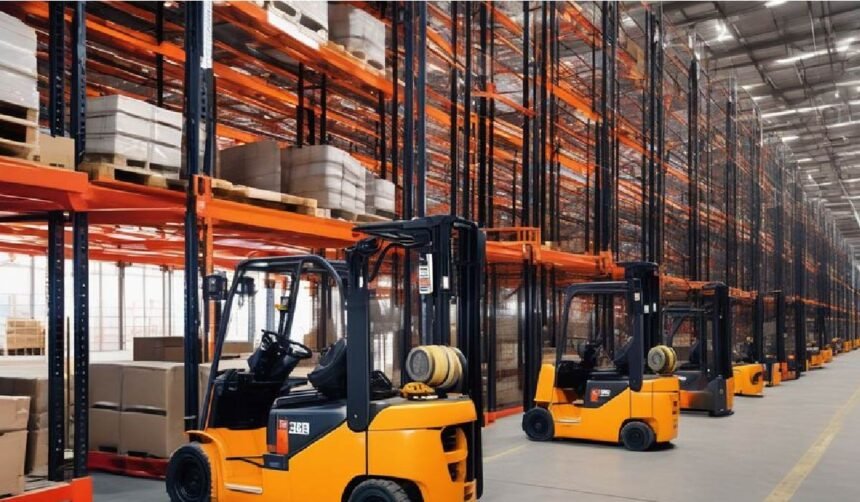In the fast-paced world of logistics, manufacturing, warehousing, and construction, efficiency isn’t just a luxury—it’s a necessity. Among the essential tools that keep these industries running smoothly, the forklift stands out as a symbol of power, precision, and productivity. However, not every business needs—or can afford—to own a fleet of forklifts outright.
That’s where equipment flexibility comes in, and more specifically, the growing demand for forklift rentals. Businesses today are rethinking traditional ownership models and turning to smarter, scalable solutions that align with their operations and budgets. Whether you’re managing a short-term project or adjusting to seasonal demand, renting forklifts can provide the perfect balance of performance and practicality.
This article explores the benefits, applications, and considerations of renting forklifts, helping you make informed decisions that boost your workflow and bottom line.
Understanding the Role of Forklifts in Modern Operations
Forklifts are indispensable machines designed to move heavy materials quickly and safely. Their applications range from lifting pallets in a warehouse to unloading cargo on construction sites. These versatile machines come in various models suited for different environments:
- Electric Forklifts: Ideal for indoor use, offering clean operation and quiet performance.
- Diesel and Gas Forklifts: Better suited for outdoor tasks where power and endurance are key.
- Rough Terrain Forklifts: Designed for unstable surfaces like gravel, sand, or uneven ground.
- Pallet Jacks and Stackers: Used for lighter loads and tighter spaces.
Selecting the right type of forklift is critical, and renting allows companies to choose the exact model suited to their specific task—without the commitment of ownership.
Why Renting Makes Strategic Business Sense
Many companies across industries are discovering that renting forklifts provides more than just convenience—it’s a strategic move that impacts cost, productivity, and flexibility.
1. Cost Efficiency
Purchasing new equipment involves a significant capital investment. For many businesses, especially smaller operations or startups, this isn’t always feasible. Renting removes the need for high upfront costs and allows funds to be allocated toward other business priorities.
Plus, rental agreements often include maintenance, servicing, and support, further reducing hidden ownership costs.
2. Flexibility in Operations
Project scopes and workloads fluctuate. Owning a fixed number of machines may not be sufficient—or may be excessive—depending on changing demands. Rentals give you the freedom to scale up or down instantly based on need.
This is especially useful during:
- Seasonal peaks (e.g., retail inventory season)
- Short-term construction projects
- Unexpected equipment breakdowns
3. Access to Latest Technology
Forklift models are continuously evolving, offering new features for safety, energy efficiency, and performance. When you rent, you’re more likely to access newer, better-performing models—without worrying about depreciation or resale value.
Key Industries That Benefit from Forklift Rentals
Forklifts are used across a wide range of sectors, each with unique demands. Renting allows companies in these industries to tailor equipment use without long-term investment.
1. Warehousing and Distribution
Fast-paced, high-volume environments require reliable equipment that’s easy to swap or upgrade. Rental forklifts keep warehouses agile and responsive to spikes in demand or changing layouts.
2. Construction
Heavy loads, outdoor terrain, and project timelines all make construction a prime candidate for short- or mid-term forklift rentals. With rugged models available, contractors can get the exact equipment needed without long-term storage or maintenance issues.
3. Retail and Wholesale
Large deliveries, product movement, and seasonal stocking can overwhelm standard logistics systems. Temporary forklifts ensure product flows smoothly during high-demand periods.
4. Manufacturing
When production ramps up, having the right equipment at the right time is critical. Rentals help fill gaps without affecting existing supply chains or creating bottlenecks.
5. Event and Trade Show Logistics
Temporary setups often require short-term lifting and transportation. Renting forklifts enables event organizers to handle logistics with minimal investment and maximum convenience.
Common Forklift Rental Periods and Pricing Structures
Rentals are typically offered in three main durations:
- Daily Rentals: Ideal for one-off tasks or emergencies
- Weekly Rentals: Good for short-term projects or temporary workload spikes
- Monthly Rentals: Cost-effective for extended use without long-term ownership
Prices vary depending on the type of forklift, location, duration, and additional services such as delivery, operator training, or maintenance coverage. Electric models tend to cost less than diesel-powered or rough-terrain units due to lower operational costs.
Many rental companies offer volume discounts, loyalty pricing, or flexible terms for long-term customers. Transparency in pricing is key, so always ask for a full cost breakdown to avoid surprises.
Features to Consider When Renting a Forklift
Before signing a rental agreement, take time to assess your exact needs. Consider the following:
1. Load Capacity
Determine the heaviest loads you plan to move. Overloading a forklift can lead to dangerous situations and equipment damage.
2. Lift Height
Consider how high you need to lift your loads. Standard forklifts typically reach 10–15 feet, but high-reach or order-picking models can go higher.
3. Fuel Type
Indoor or enclosed spaces may require electric forklifts to avoid emissions, while outdoor applications may benefit from gas or diesel power.
4. Tire Type
- Cushion Tires: For smooth indoor surfaces
- Pneumatic Tires: For outdoor or rough terrain
5. Attachments
Some jobs require special tools such as:
- Fork extensions
- Rotators
- Clamps
- Side shifters
Make sure your rental provider can supply compatible attachments if needed.
Safety Considerations and Operator Training
No matter how advanced the equipment is, safety always depends on proper use. Renting from a reputable provider ensures you get forklifts that are inspected, maintained, and compliant with industry safety standards.
Additionally, it’s crucial that anyone operating the equipment is properly trained and certified. Some rental providers offer operator training, which can be especially helpful for companies that don’t have a large team of experienced drivers.
Safety best practices include:
- Regular pre-use inspections
- Clear signage and path marking
- Weight and lift limit awareness
- Communication tools (e.g., horns, lights, alarms)
By combining well-maintained equipment with trained personnel, businesses reduce the risk of accidents and liability.
How to Choose the Right Rental Provider
Not all rental companies are the same. When searching for a provider, consider:
- Variety of Equipment: Do they offer multiple models and brands?
- Maintenance Support: Are service and repairs included?
- Availability: Can they deliver quickly or on short notice?
- Flexibility: Can you adjust your rental term if needed?
- Reputation: Do they have solid customer reviews and references?
Clear communication, transparent pricing, and responsive service are key indicators of a reliable provider.
Comparing Renting vs. Buying
Renting
- Low upfront cost
- Flexible duration
- Maintenance often included
- Best for short-term or seasonal needs
Buying
- High initial investment
- Long-term ownership
- Requires in-house maintenance or service contracts
- Best for companies with constant, year-round forklift usage
The choice ultimately comes down to the duration of use, available capital, and long-term business goals. In many cases, forklift rentals act as a stepping stone—helping businesses grow until they’re ready to invest in ownership.
Final Thoughts
As industries become more dynamic and demand-driven, businesses must stay lean, flexible, and efficient. Renting forklifts offers an ideal solution: it minimizes capital outlay while maximizing access to high-quality, task-specific equipment.
From managing seasonal inventory to keeping construction projects on schedule, forklift rentals provide the versatility and dependability modern operations require. By selecting the right machine, working with a trusted provider, and maintaining a focus on safety and performance, companies can unlock new levels of productivity—without the burden of ownership.
If you’re considering your next material handling upgrade, take a close look at how forklift rentals might fit into your operation. The benefits speak for themselves—and the results often exceed expectations.









